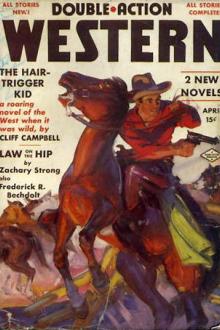The Light of the Western Stars, Zane Grey [e reader pdf best .TXT] 📗

- Author: Zane Grey
Book online «The Light of the Western Stars, Zane Grey [e reader pdf best .TXT] 📗». Author Zane Grey
CONTENTS
THE LIGHT OF WESTERN STARS
I. A Gentleman of the Range
II. A Secret Kept
III. Sister and Brother
IV. A Ride From Sunrise To Sunset
V. The Round-Up
VI. A Gift and A Purchase
VII. Her Majesty's Rancho
VIII. El Capitan
IX. The New Foreman
X. Don Carlos's Vaqueros
XI. A Band of Guerrillas
XII. Friends from the East
XIII. Cowboy Golf
XIV. Bandits
XV. The Mountain Trail
XVI. The Crags
XVII. The Lost Mine of the Padres
XVIII. Bonita
XIX. Don Carlos
XX. The Sheriff of El Cajon
XXI. Unbridled
XXII. The Secret Told
XXIII. The Light of Western Stars
XXIV. The Ride
XXV. At the End of the Road
I. A Gentleman of the Range
When Madeline Hammond stepped from the train at El Cajon, New Mexico, it was nearly midnight, and her first impression was of a huge dark space of cool, windy emptiness, strange and silent, stretching away under great blinking white stars.
“Miss, there's no one to meet you,” said the conductor, rather anxiously.
“I wired my brother,” she replied. “The train being so late—perhaps he grew tired of waiting. He will be here presently. But, if he should not come—surely I can find a hotel?”
“There's lodgings to be had. Get the station agent to show you. If you'll excuse me—this is no place for a lady like you to be alone at night. It's a rough little town—mostly Mexicans, miners, cowboys. And they carouse a lot. Besides, the revolution across the border has stirred up some excitement along the line. Miss, I guess it's safe enough, if you—”
“Thank you. I am not in the least afraid.”
As the train started to glide away Miss Hammond walked towards the dimly lighted station. As she was about to enter she encountered a Mexican with sombrero hiding his features and a blanket mantling his shoulders.
“Is there any one here to meet Miss Hammond?” she asked.
“No sabe, Senora,” he replied from under the muffling blanket, and he shuffled away into the shadow.
She entered the empty waiting-room. An oil-lamp gave out a thick yellow light. The ticket window was open, and through it she saw there was neither agent nor operator in the little compartment. A telegraph instrument clicked faintly.
Madeline Hammond stood tapping a shapely foot on the floor, and with some amusement contrasted her reception in El Cajon with what it was when she left a train at the Grand Central. The only time she could remember ever having been alone like this was once when she had missed her maid and her train at a place outside of Versailles—an adventure that had been a novel and delightful break in the prescribed routine of her much-chaperoned life. She crossed the waiting-room to a window and, holding aside her veil, looked out. At first she could descry only a few dim lights, and these blurred in her sight. As her eyes grew accustomed to the darkness she saw a superbly built horse standing near the window. Beyond was a bare square. Or, if it was a street, it was the widest one Madeline had ever seen. The dim lights shone from low, flat buildings. She made out the dark shapes of many horses, all standing motionless with drooping heads. Through a hole in the window-glass came a cool breeze, and on it breathed a sound that struck coarsely upon her ear—a discordant mingling of laughter and shout, and the tramp of boots to the hard music of a phonograph.
“Western revelry,” mused Miss Hammond, as she left the window. “Now, what to do? I'll wait here. Perhaps the station agent will return soon, or Alfred will come for me.”
As she sat down to wait she reviewed the causes which accounted for the remarkable situation in which she found herself. That Madeline Hammond should be alone, at a late hour, in a dingy little Western railroad station, was indeed extraordinary.
The close of her debutante year had been marred by the only unhappy experience of her life—the disgrace of her brother and his leaving home. She dated the beginning of a certain thoughtful habit of mind from that time, and a dissatisfaction with the brilliant life society offered her. The change had been so





Comments (0)